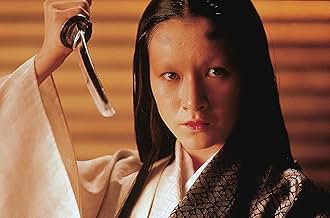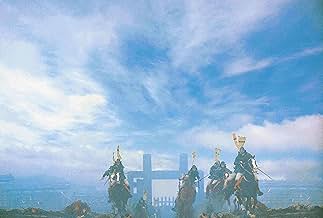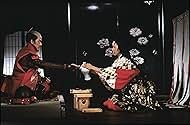मध्यकालीन जापान में, एक वृद्ध सरदार सेवानिवृत्त होता है, जो अपने तीनों पुत्रों को अपना साम्राज्य सौंपता है. हालांकि, वह काफी हद तक कम आंकता हैं कि नई नई शक्ति उन्हें कैसे भ्रष्ट करेगी.मध्यकालीन जापान में, एक वृद्ध सरदार सेवानिवृत्त होता है, जो अपने तीनों पुत्रों को अपना साम्राज्य सौंपता है. हालांकि, वह काफी हद तक कम आंकता हैं कि नई नई शक्ति उन्हें कैसे भ्रष्ट करेगी.मध्यकालीन जापान में, एक वृद्ध सरदार सेवानिवृत्त होता है, जो अपने तीनों पुत्रों को अपना साम्राज्य सौंपता है. हालांकि, वह काफी हद तक कम आंकता हैं कि नई नई शक्ति उन्हें कैसे भ्रष्ट करेगी.
- 1 ऑस्कर जीते
- 30 जीत और कुल 23 नामांकन
Mansai Nomura
- Tsurumaru
- (as Takeshi Nomura)
सारांश
Reviewers say 'Ran' is celebrated for its epic scale, masterful direction, and stunning visuals. Adapted from Shakespeare's 'King Lear,' it is lauded for its intricate narrative, powerful performances by Tatsuya Nakadai and Mieko Harada, and deep exploration of power, corruption, and betrayal. The cinematography and battle scenes are noted for their grandeur. Some find its slow pace and long runtime challenging, yet it is often hailed as one of Kurosawa's finest works.
फ़ीचर्ड समीक्षाएं
'Ran' is the Japanese word for chaos, riot, dissension. Akira Kurosawa's masterpiece is indeed a feast of destruction and perdition, charged with symbols and powerful in pictures like it is found very rarely in today's cinema.
The dusky story is based on Shakespeare's 'King Lear'. In the film a Japanese warlord celebrates his own downfall. Kurosawa devised this with a radical film language which works with certain imageries of colors, rapid cut sequences and a sophisticated sound design. When the colorful flags of the different armies get intermixed in a battle, when the peacefully quiet wind (which carries the soundtrack) swells to a raving storm or when long wide shots suddenly segue into shots of details that follow hot on each other's heels then you realize Kurosawa's incredible style which deeply influenced the cinema worldwide.
The drawings of the characters are equally terrific. Hidetora's jester is for a certain reason always at the side of the warlord. Their relationship alters as the film continues: Jester and warlord change their roles which makes it hard to distinguish both. Just as the sky turns from blue to grey with dark clouds, the violent past of Hidetora is catching up the aging lord. His trail of murder and predation is not forgotten, the brutally conquered land still carries the old scarves of war and exploitation which now burst out again.
The viewer can take this monumental work as a warning to the destructive power of war, which is even decades later at present and beset those who seed the violence.
The dusky story is based on Shakespeare's 'King Lear'. In the film a Japanese warlord celebrates his own downfall. Kurosawa devised this with a radical film language which works with certain imageries of colors, rapid cut sequences and a sophisticated sound design. When the colorful flags of the different armies get intermixed in a battle, when the peacefully quiet wind (which carries the soundtrack) swells to a raving storm or when long wide shots suddenly segue into shots of details that follow hot on each other's heels then you realize Kurosawa's incredible style which deeply influenced the cinema worldwide.
The drawings of the characters are equally terrific. Hidetora's jester is for a certain reason always at the side of the warlord. Their relationship alters as the film continues: Jester and warlord change their roles which makes it hard to distinguish both. Just as the sky turns from blue to grey with dark clouds, the violent past of Hidetora is catching up the aging lord. His trail of murder and predation is not forgotten, the brutally conquered land still carries the old scarves of war and exploitation which now burst out again.
The viewer can take this monumental work as a warning to the destructive power of war, which is even decades later at present and beset those who seed the violence.
With RAN (1985) Akira Kurosawa seems to be setting up a macarbe trap. The first section of the film is slow, following an aging warlord (Tatsuya Nakadai's best acting in a long wonderous career.) dividing his castles amongst his unsavory sons. The action is slow, people talk in low tones, it's almost at snail's pace. But then, a battle scene like nothing you ever seen before explodes on the screen. The film takes a 180 degree turn and becomes more and more sinister, more compelling. You can't look away.
Akira Kurosawa (1910-1997) was responsible for elevating Japanese cinema to a front-runner in world cinema. Two of his films, RASHOMON and SEVEN SAMURAI were made in less than ten years after World War II. These films put a spotlight on Japanese culture. Some of his later films, THE HIDDEN FORTRESS, THE BAD SLEEP WELL, YOJIMBO and HIGH AND LOW became the basis for a good percentage of the major American films produced after 1960.
If you sit down to see RAN, be prepared for a jaw-dropping experience.
Akira Kurosawa (1910-1997) was responsible for elevating Japanese cinema to a front-runner in world cinema. Two of his films, RASHOMON and SEVEN SAMURAI were made in less than ten years after World War II. These films put a spotlight on Japanese culture. Some of his later films, THE HIDDEN FORTRESS, THE BAD SLEEP WELL, YOJIMBO and HIGH AND LOW became the basis for a good percentage of the major American films produced after 1960.
If you sit down to see RAN, be prepared for a jaw-dropping experience.
Thankee kindly.
Kurosawa, while a great director, isn't somebody whose films I blindly endorse.
However, Ran takes the cake. It easily makes my personal top five films any time I think about it.
The imagery is absolutely stunning, and the dialogue is quite clever. The battle scenes are suitably horrific, and the humor (and yes, there is humor) is subtle enough not to get in the way.
All told, one of the greatest films it's been my privilege to see. I watched it to get the nightmare that was Cold Mountain out of my head, as proof that long movies can actually be epic, as opposed to boring, trite, and predictable.
Kurosawa, while a great director, isn't somebody whose films I blindly endorse.
However, Ran takes the cake. It easily makes my personal top five films any time I think about it.
The imagery is absolutely stunning, and the dialogue is quite clever. The battle scenes are suitably horrific, and the humor (and yes, there is humor) is subtle enough not to get in the way.
All told, one of the greatest films it's been my privilege to see. I watched it to get the nightmare that was Cold Mountain out of my head, as proof that long movies can actually be epic, as opposed to boring, trite, and predictable.
Based on Shakespeare's King Lear, this film follows the story of the aging warlord Hidetora who, in an attempt to restore peace, divides his kingdom between his three sons - Taro, Jiro, and Saburo - and retires from his duties. However, one of his sons sees this as unwise and is banished by his father, leaving his two brothers in charge of two of the three castles left in their hands. It isn't long before they are overtaken by greed and eventually betray their father, leaving him in the hands of a philosophical jester and a loyal retainer. This betrayal ultimately leads to war, dividing the family and driving Hidetora insane.
The remarkable script, which contains many of my favorite lines from any film, still manages to break its way through the confinement of subtitles and reveals itself to be one of the richest Kurosawa ever wrote. He has obviously worked equally hard on the look and feel of the film - the cinematography being excellent (example: the long, continuous shot of Saburo's men charging on horseback across a river).
There's also something rather frightening about it that I can't quite put my finger on. The first battle, which is the film's turning point, is the most horrifying, yet strangely beautiful, battles ever filmed. A good effect used is the loss of sound, with only Toru Takemitsu's haunting score to be heard. The entire battle lasts less than ten minutes and there is no uplifting or bombastic music to be heard, but in my opinion, it's Ran's finest scene, and thus the finest scene ever.
What Kurosawa managed to get rather than give though was excellent performances from his actors, none more brilliant than Tatsuya Nakadai's Hidetora, Mieko Harada as Lady Kaede (a woman similar to Lady Macbeth but with a different hidden agenda), and the strangely-named Peter as Kyoami.
The remarkable script, which contains many of my favorite lines from any film, still manages to break its way through the confinement of subtitles and reveals itself to be one of the richest Kurosawa ever wrote. He has obviously worked equally hard on the look and feel of the film - the cinematography being excellent (example: the long, continuous shot of Saburo's men charging on horseback across a river).
There's also something rather frightening about it that I can't quite put my finger on. The first battle, which is the film's turning point, is the most horrifying, yet strangely beautiful, battles ever filmed. A good effect used is the loss of sound, with only Toru Takemitsu's haunting score to be heard. The entire battle lasts less than ten minutes and there is no uplifting or bombastic music to be heard, but in my opinion, it's Ran's finest scene, and thus the finest scene ever.
What Kurosawa managed to get rather than give though was excellent performances from his actors, none more brilliant than Tatsuya Nakadai's Hidetora, Mieko Harada as Lady Kaede (a woman similar to Lady Macbeth but with a different hidden agenda), and the strangely-named Peter as Kyoami.
The 'Kurosawa' adaptation of King Lear in his film 'Ran' is a tremendous memorable film.
It is a very dramatic film with many soliloquies and dialogue, but if you are patient with it, you are treated to some of the most epic scenes of cinematic brilliance that Kurosawa made. After all it is Shakespeare and one must be patient with it if they are not a fan of the old school theatre.
Colourfull clashing armies, The lord awaiting his fate in a burning castle, a brilliant execution scene (I consider the BEST I have ever seen film ever), and the blind being left in the hands of Buddha?
While Seven Samurai will always be his perfection, Ran is more than an enjoyable movie that should be seen. Just stick with it and you'll never forget it.
Rating 9 out of 10.
It is a very dramatic film with many soliloquies and dialogue, but if you are patient with it, you are treated to some of the most epic scenes of cinematic brilliance that Kurosawa made. After all it is Shakespeare and one must be patient with it if they are not a fan of the old school theatre.
Colourfull clashing armies, The lord awaiting his fate in a burning castle, a brilliant execution scene (I consider the BEST I have ever seen film ever), and the blind being left in the hands of Buddha?
While Seven Samurai will always be his perfection, Ran is more than an enjoyable movie that should be seen. Just stick with it and you'll never forget it.
Rating 9 out of 10.
क्या आपको पता है
- ट्रिवियाAkira Kurosawa's wife of 39 years, Yôko Yaguchi, died during the production of this film. Kurosawa halted filming for just one day to mourn before resuming work on the picture.
- गूफ़During the siege on the third castle, the corpse of one of Hidetora's guards suddenly shuts his eyes just before a volley of arrows flies past him.
टॉप पसंद
रेटिंग देने के लिए साइन-इन करें और वैयक्तिकृत सुझावों के लिए वॉचलिस्ट करें
विवरण
बॉक्स ऑफ़िस
- बजट
- $1,15,00,000(अनुमानित)
- US और कनाडा में सकल
- $43,14,927
- US और कनाडा में पहले सप्ताह में कुल कमाई
- $3,567
- 2 जुल॰ 2000
- दुनिया भर में सकल
- $43,85,618
- चलने की अवधि2 घंटे 40 मिनट
- रंग
- पक्ष अनुपात
- 1.85 : 1
इस पेज में योगदान दें
किसी बदलाव का सुझाव दें या अनुपलब्ध कॉन्टेंट जोड़ें




































